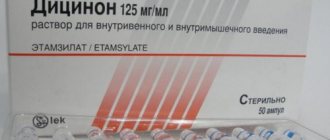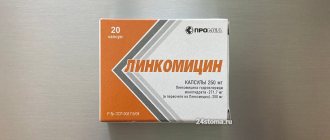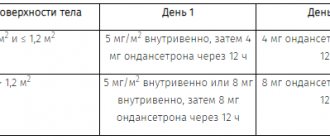Mexicor®
Mexicor® has antioxidant, antihypoxic, membrane-protective, nootropic, stress-protective, anticonvulsant, and anxiolytic effects.
The drug increases the body's resistance to the effects of major damaging factors, to oxygen-dependent pathological conditions (shock, hypoxia and ischemia, cerebrovascular accident, intoxication with alcohol and antipsychotics (neuroleptics)).
The mechanism of action of Mexicor® is due to the antihypoxic, antioxidant and membrane-protective effects of ethylmethylhydroxypyridine succinate and succinic acid included in its composition.
The drug improves the functional state of ischemic myocardium during myocardial infarction, improves the contractile function of the heart, and also reduces the manifestations of systolic and diastolic dysfunction of the left ventricle.
The drug normalizes metabolic processes in the ischemic myocardium, reduces the necrosis zone, restores and/or improves the electrical activity and contractility of the myocardium, and also increases its collateral blood supply, activating energy-synthesizing processes in the ischemic zone and helping to preserve the integrity of cardiomyocytes and maintain their functional activity.
Increases the antianginal activity of nitro drugs, improves the rheological properties of blood, reduces the consequences of reperfusion syndrome in acute coronary insufficiency.
The drug improves blood supply to the brain and cerebral metabolism, improves microcirculation and rheological properties of blood, and prevents a decrease in cerebral blood flow during the reperfusion period after ischemia. It has a hypolipidemic effect, reduces the content of total cholesterol and low-density lipoproteins. Mexicor® prevents a post-ischemic drop in the utilization of glucose and oxygen by the brain and prevents the progressive accumulation of lactate.
The drug inhibits the processes of lipid peroxidation, increases the activity of superoxide dismutase, increases the lipid-protein ratio, and improves the structure and function of the cell membrane. Modulates the activity of membrane-bound enzymes - calcium-independent phosphodiesterase, adenylate cyclase, acetylcholinesterase, receptor complexes (benzodiazepine, gamma-aminobutyric, acetylcholine), which enhances their ability to bind to ligands, helps preserve the structural and functional organization of biomembranes, transport of neurotransmitters and improve synaptic transmission. Mexicor® increases dopamine levels in the brain.
Mexicor® causes an increase in the compensatory activity of aerobic glycolysis and helps reduce the degree of inhibition of oxidative processes in the Krebs cycle under hypoxic conditions with an increase in the content of adenosine triphosphate (ATP), creatine phosphate and activation of the energy-synthesizing functions of mitochondria, stabilization of cell membranes.
Mexicor amp 50mg/ml 2ml N10 (EcoPharmInvest)
Mexicor® reduces the manifestations of oxidative stress by inhibiting free radical lipid peroxidation and increasing the activity of the antioxidant enzyme system. Improves cellular energy metabolism, activating the energy-synthesizing functions of mitochondria, enhancing compensatory activation of aerobic glycolysis and reducing the degree of inhibition of oxidative processes in the Krebs cycle. The energy-synthesizing effect of the drug is associated with an increase in the delivery and consumption of succinate by cells, the implementation of the phenomenon of rapid oxidation of succinic acid by succinate dehydrogenase, as well as with the activation of the mitochondrial respiratory chain. When the drug Mexicor® dissociates in the cell into succinate and a 3-hydroxypyridine derivative (base), the base exhibits an antioxidant effect that stabilizes cell membranes and restores the functional activity of cells. The action of the drug is based on its antioxidant activity, the ability to inhibit free radical processes (a pronounced intensification of which is observed during myocardial ischemia and necrosis, especially during the period of reperfusion) and reduces the damaging effect of free radicals on cardiomyocytes. Reduces the viscosity of the cell membrane, increases its fluidity and has a modulating effect on membrane-bound enzymes (calcium-independent PDE, adenylate cyclase, acetylcholinesterase), ion channels and receptor complexes, which helps maintain the structural and functional integrity of biomembranes, improves the transport of neurotransmitters and synaptic transmission. Improves metabolism and blood supply to the brain, microcirculation and rheological properties of blood, reduces platelet aggregation. Improves the functional state of ischemic myocardium, contractile function of the heart, and also reduces the manifestations of systolic and diastolic dysfunction of the left ventricle. In conditions of coronary insufficiency, it increases collateral blood supply to the ischemic myocardium and activates energy-synthesizing processes in the ischemic zone, which helps preserve the integrity of cardiomyocytes and maintain their functional activity. Effectively restores myocardial contractility during reversible cardiac dysfunction, which represents a significant reserve for increasing cardiac contractility in patients with coronary artery disease complicated by heart failure. In patients with stable angina pectoris, it increases exercise tolerance and the antianginal activity of nitro drugs, improves the rheological properties of blood. The addition of Mexicor® to standard therapy for coronary artery disease improves the clinical condition of patients, increasing exercise tolerance and improving quality of life. Mexicor® stabilizes the membrane structures of the vascular wall, inhibits platelet aggregation, normalizes microcirculation disorders in the early stages of atherogenesis, has a hypolipidemic effect, and reduces the content of total cholesterol and low-density lipoproteins (LDL). Mexicor® has a neuroprotective effect on the functional activity and metabolism of the ischemic brain, increases the stability of cerebral circulation in conditions of hypoperfusion, and prevents a decrease in cerebral blood flow in the reperfusion period after ischemia. The drug promotes adaptation to the damaging effects of ischemia by inhibiting the depletion of carbohydrate reserves, blocking the post-ischemic drop in the utilization of glucose and oxygen by the brain and preventing the progressive accumulation of lactate. At the same time, the indicators of autoregulatory reactions of cerebral vessels improve. Mexicor® has nootropic properties, prevents and reduces learning and memory impairments that occur in acute and chronic vascular diseases of the brain, with mild and moderate cognitive impairment of various origins, has an antioxidant effect, increases concentration and performance. The inclusion of the drug Mexicor® in the complex therapy of patients with acute cerebrovascular accident reduces the severity of clinical manifestations of stroke and improves the course of the rehabilitation period. Mexicor® has a selective anxiolytic effect, not accompanied by sedation and muscle relaxation, eliminates anxiety, fear, tension, restlessness, increases adaptation and emotional status.
Mexicor, 50 mg/ml, solution for intravenous and intramuscular administration, 2 ml, 10 pcs.
Mexicor® improves the functional state of ischemic myocardium during myocardial infarction, improves the contractile function of the heart, and also reduces the manifestations of systolic and diastolic dysfunction of the left ventricle. The action of the drug is based on its antioxidant activity, the ability to inhibit free radical processes (pronounced intensification of which is observed during myocardial ischemia and necrosis, especially during the period of reperfusion) and reduce the damaging effect of free radicals on cardiomyocytes. In conditions of a critical decrease in coronary blood flow, Mexicor® helps preserve the structural and functional organization of cardiomyocyte membranes, stimulates the activity of membrane enzymes - PDE, adenylate cyclase, acetylcholinesterase. The drug supports the activation of aerobic glycolysis that develops during acute ischemia and promotes the restoration of mitochondrial redox processes under hypoxic conditions, increases the synthesis of ATP and creatine phosphate. These mechanisms ensure the integrity of the morphological structures and physiological functions of the ischemic myocardium.
Mexicor® improves the clinical course of myocardial infarction, increases the effectiveness of therapy, accelerates the recovery of functional activity of the left ventricular myocardium, reduces the incidence of arrhythmic complications and intracardiac conduction disorders. The drug normalizes metabolic processes in the ischemic myocardium, reduces the area of necrosis, restores and/or improves the electrical activity and contractility of the myocardium, and also increases coronary blood flow in the ischemic zone, increases the antianginal activity of nitro drugs, improves the rheological properties of blood, reduces the consequences of reperfusion syndrome in acute coronary insufficiency .
Mexicor® has a neuroprotective effect, increases the stability of cerebral blood circulation in conditions of hypoperfusion, and prevents a decrease in cerebral blood flow during the reperfusion period after ischemia. The drug promotes adaptation to the damaging effects of ischemia by inhibiting the depletion of carbohydrate reserves, blocking the post-ischemic drop in the utilization of glucose and oxygen by the brain and preventing the progressive accumulation of lactate.
Mexicor® improves and stabilizes cerebral metabolism and blood supply to the brain, improves the rheological properties of blood and microcirculation. The drug supports the functional activity of the brain, both during ischemia and in the post-ischemic period. Mexicor® has a selective anxiolytic effect, not accompanied by sedation and muscle relaxation, and eliminates anxiety, fear, tension, and restlessness.
Mexicor® has nootropic properties, prevents and reduces learning and memory impairments that occur in vascular diseases of the brain (ischemic stroke, dyscirculatory encephalopathy), mild and moderate cognitive impairment, has an antihypoxic effect, increases concentration and performance.
The inclusion of the drug Mexicor® in complex therapy of patients with acute cerebrovascular accident reduces the severity of clinical manifestations of stroke and improves the course of the rehabilitation period.
Mexicor, 100 mg, capsules, 20 pcs.
Antioxidant drug. Ethylmethylhydroxypyridine succinate has antioxidant, antihypoxic, anti-ischemic, membrane-protective, nootropic, stress-protective, anticonvulsant, and anxiolytic effects.
The drug helps to increase the body's resistance to the effects of various damaging factors in oxygen-dependent pathological conditions (shock, hypoxia and ischemia, cerebrovascular accidents, coronary artery disease, ethanol intoxication and the state after intoxication with antipsychotic drugs). The drug reduces the manifestations of oxidative stress, inhibits free radical processes of lipid peroxidation, and increases the activity of superoxide dismutase. Modulates the activity of membrane-bound enzymes - calcium-independent PDE, adenylate cyclase, acetylcholinesterase, receptor complexes (benzodiazepine, gamma-aminobutyric, acetylcholine), which enhances their ability to bind to ligands, helps preserve the structural and functional organization of biological membranes, improves the transport of neurotransmitters and synaptic transmission. Increases dopamine levels in the brain.
The drug causes an increase in the compensatory activity of aerobic glycolysis and helps reduce the degree of inhibition of oxidative processes in the Krebs cycle under hypoxic conditions with an increase in the content of adenosine triphosphate, creatine phosphate and activation of the energy-synthesizing functions of mitochondria, stabilization of cell membranes.
In patients with stable angina pectoris, it increases tolerance to physical activity and the antianginal activity of nitro drugs, improves the rheological properties of blood. The addition of Mexicor® to standard therapy for coronary artery disease improves the clinical condition of patients, increasing exercise tolerance and improving quality of life.
The energy-synthesizing effect of Mexicor® is associated with an increase in the delivery and consumption of succinate by cells, the implementation of the phenomenon of rapid oxidation of succinic acid by succinate dehydrogenase, as well as activation of the mitochondrial respiratory chain. When ethylmethylhydroxypyridine succinate dissociates in a cell into succinate and a 3-hydroxypyridine derivative (base), the base exhibits an antioxidant effect that stabilizes cell membranes and restores the functional activity of cells.
The drug improves the functional state of ischemic myocardium during myocardial infarction, improves the contractile function of the heart, and also reduces the manifestations of systolic and diastolic dysfunction of the left ventricle. Normalizes metabolic processes in the ischemic myocardium, reduces the necrosis zone, restores the electrical activity and contractility of the myocardium, and also increases its collateral blood supply, activating energy-synthesizing processes in the ischemic zone and helping to preserve the integrity of cardiomyocytes and maintain their functional activity. Effectively restores myocardial contractility during reversible cardiac dysfunction, which represents a significant reserve for increasing cardiac contractility in patients with coronary artery disease.
In patients with stable angina pectoris, it increases exercise tolerance and the antianginal activity of nitro drugs, improves the rheological properties of blood, reduces platelet aggregation and the consequences of reperfusion syndrome in acute coronary insufficiency. It has a lipid-lowering effect, reduces the content of total cholesterol and LDL.
Improves blood supply to the brain and cerebral metabolism, improves blood microcirculation, prevents a decrease in cerebral blood flow during the reperfusion period after ischemia. Prevents a post-ischemic drop in the utilization of glucose and oxygen by the brain, and prevents the progressive accumulation of lactate. The drug has a selective anxiolytic effect, not accompanied by sedation and muscle relaxation, eliminates anxiety, fear, tension, restlessness, increases adaptation and emotional status.
The effectiveness of the drug under stressful conditions is manifested in the normalization of post-stress behavior, psycho-vegetative disorders, restoration of sleep-wake cycles, mnestic functions, learning processes, and a decrease in structural changes in the brain substance. The drug is characterized by a pronounced antitoxic effect during withdrawal syndrome. Eliminates the neurological manifestations of acute alcohol intoxication, restores behavioral disorders, autonomic functions, and is also able to reduce cognitive impairment caused by long-term use of ethanol. Under the influence of ethylmethylhydroxypyridine succinate, the effect of tranquilizing, neuroleptic, antidepressant, hypnotics and anticonvulsants is enhanced, which makes it possible to reduce their doses and reduce side effects.
Mexicor®
Antioxidant drug.
Mexicor® reduces the manifestations of oxidative stress by inhibiting free radical lipid peroxidation and increasing the activity of the antioxidant enzyme system. Mexicor® improves cellular energy metabolism by activating the energy-synthesizing functions of mitochondria, enhancing compensatory activation of aerobic glycolysis and reducing the degree of inhibition of oxidative processes in the Krebs cycle.
The energy-synthesizing effect of the drug is associated with an increase in the delivery and consumption of succinate by cells, the implementation of the phenomenon of rapid oxidation of succinic acid by succinate dehydrogenase, as well as with the activation of the mitochondrial respiratory chain. When Mexicor® dissociates in a cell into succinate and a 3-hydroxypyridine derivative (base), the base exhibits a powerful antioxidant effect that stabilizes cell membranes and restores the functional activity of cells. Reduces the viscosity of the cell membrane, increases its fluidity and has a modulating effect on membrane-bound enzymes (calcium-independent phosphodiesterase, adenylate cyclase, acetylcholinesterase), ion channels and receptor complexes, which helps maintain the structural and functional integrity of biomembranes, improves the transport of neurotransmitters and synaptic transmission.
The drug improves cerebral metabolism and blood supply to the brain, improves microcirculation and rheological properties of blood, and reduces platelet aggregation.
Improves the functional state of ischemic myocardium, contractile function of the heart, and also reduces the manifestations of systolic and diastolic dysfunction of the left ventricle. In conditions of coronary insufficiency, it increases collateral blood supply to the ischemic myocardium and activates energy-synthesizing processes in the ischemic zone, which helps preserve the integrity of cardiomyocytes and maintain their functional activity. Effectively restores myocardial contractility during reversible cardiac dysfunction, which represents a significant reserve for increasing cardiac contractility in patients with coronary artery disease complicated by heart failure.
In patients with stable angina pectoris, it increases exercise tolerance and the antianginal activity of nitrates, improves the rheological properties of blood. The addition of Mexicor® to standard therapy for coronary artery disease improves the clinical condition of patients, increasing exercise tolerance and improving quality of life.
Mexicor® stabilizes the membrane structures of the vascular wall, inhibits platelet aggregation, normalizes microcirculation disorders in the early stages of atherogenesis, has a hypolipidemic effect, and reduces the content of total cholesterol and LDL.
Mexicor® has a neuroprotective effect on the functional activity and metabolism of the ischemic brain, increases the stability of cerebral circulation in conditions of hypoperfusion, and prevents a decrease in cerebral blood flow during the reperfusion period after ischemia. The drug promotes adaptation to the damaging effects of ischemia by inhibiting the depletion of carbohydrate reserves, blocking the post-ischemic drop in the utilization of glucose and oxygen by the brain and preventing the progressive accumulation of lactate. At the same time, the indicators of autoregulatory reactions of cerebral vessels improve.
Mexicor® has nootropic properties, prevents and reduces disturbances in learning and memory processes that occur in acute and chronic vascular diseases of the brain, in mild and moderate cognitive impairment of various origins, has an antioxidant effect, increases concentration and performance.
The inclusion of the drug Mexicor® in complex therapy of patients with acute cerebrovascular accident reduces the severity of clinical manifestations of stroke and improves the course of the rehabilitation period.
Mexicor® has a selective anxiolytic effect, not accompanied by sedation and muscle relaxation, eliminates anxiety, fear, tension, restlessness, increases adaptation and emotional status.



